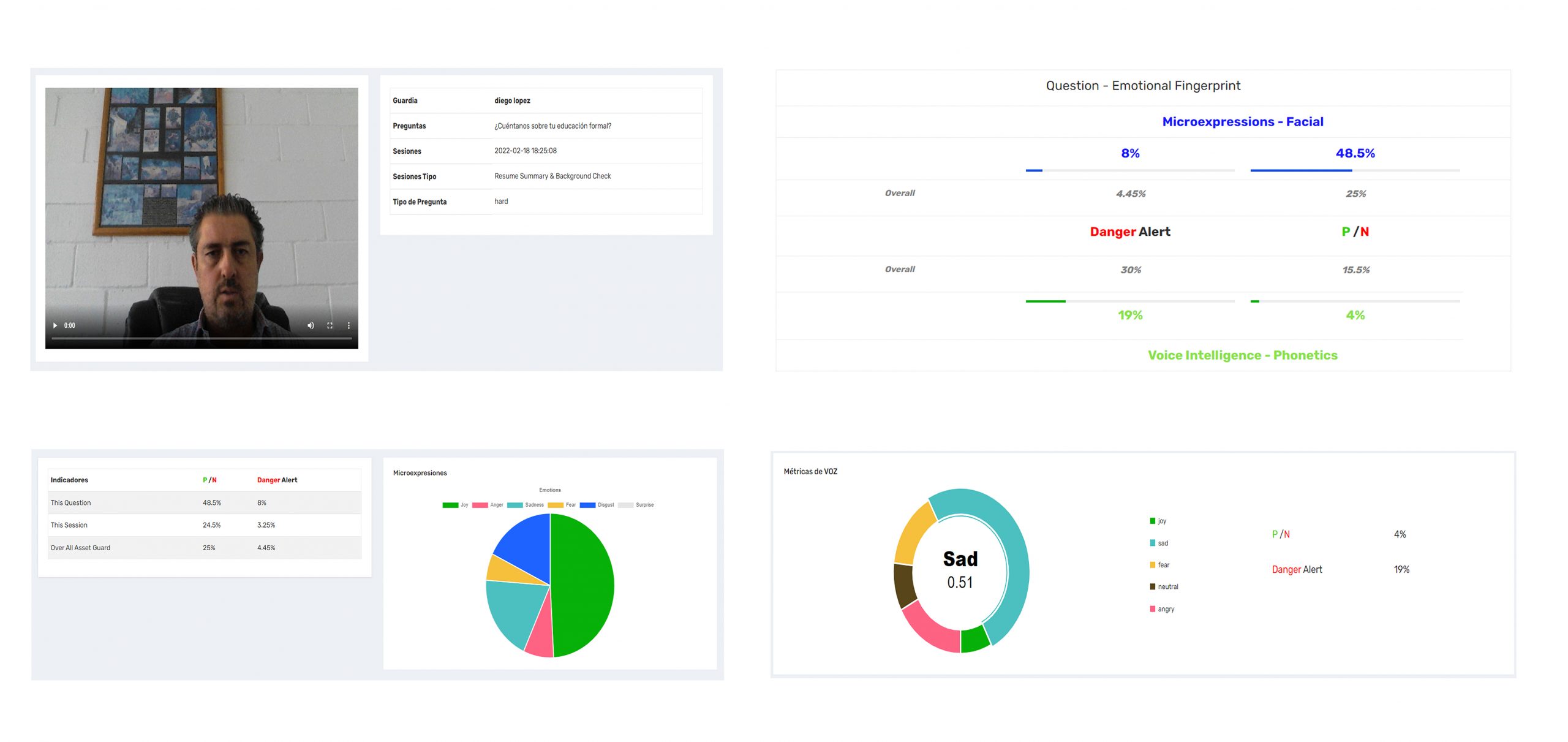The Examiners and Observers detail process.
Emotional Scan is the Perfect Equation since it uses Artificial Intelligence + Hard Data Metrics + Examiner’s Human Perception = Diagnose and review alerts in the volunteer interview, that can improve its Mental Health and solve critical issues.
The fundamental role of the Emotional Scan Examiner/observer is to evaluate the emotional fingerprint of the volunteer at the interview and diagnose the current situation relative to the specific Interview Type selected, with the support of Observers if needed.
There are three different levels where the Examiner and the Observers review the volunteer’s metrics such as;
Sessions scores, Questions, Video Responses, and Support information.
Let’s start at the top level
The Emotional Fingerprint consolidates automated metrics and the manual evaluation of the volunteer, including the scoring by the examiner, that integrates a complete diagnosis without bias.

Metric Interpretation Guidelines:
Alert / Warning – Variations and correlations that are activated automatically can indicate a reaction that should be deepened with complementary questions.
P/N – Positive to Negative Emotions. It is understood as a correlation between the possible negative emotions that are registered vs. the positive emotions that are experienced result being the percentage higher means that the person has fewer negative alterations.
Danger Alert – Angers the rest of the emotions, which is indicative of a necessary deeper evaluation of the question by the examiner.
Soft Questions (Soft) – Hard (Specific or Research): to determine a base of answers that calibrate the emotional registers of the person throughout the examination.
TRUST f is the ratio of emotions P/N of the Hard questions over the Soft ones. The lower the percentage, the greater the need for examination.
Manual Metrics – Assigned by Examiner
Good Volunteer – Examiner evaluation that is carried out on each question or value to achieve the qualification of the candidate.
Honesty Score is a collection of elements that we call “Checkpoints” that record a person’s bodily and verbal reactions when they are interviewed. Through detailed observation, it can be detected if they are lying.

The “Diagnose & Evaluate” module is a working space where the Examiner analyzes the sessions recorded by the Volunteer and includes the manual assessment of the Climate Categories and Values.
The Key Performance Indicators at the Question and Session levels allow the examiner to drill down and carry out a volunteer’s detailed assessment of each question.
Now let’s review in detail how the Examiner should execute the function:
There are 3 sources of emotional data, first facial microexpressions; second, voice phonetics; and third, transcripts.
The Emotional Scan, three main metrics are “Positive versus Negative” emotions, second the “Trust Factor,” which measures positive versus negative emotions from the Hard questions against the soft, and finally, the Danger Alert, which represents anger versus other emotions, all critical elements in the evaluation process.
Human perception is crucial when the Examiner evaluates the “Good Volunteer” Score on the Scroll Bar in 5-positions.
The examiner can evaluate trends and patterns of the Hard questions with the help of Alerts triggered by an automated algorithm at the question and session levels.
An Alert or Warning indicates to the examiner that further review of the question video recording and related metrics is required.
Additional and complementary questions are recommended for deeper research and a fair evaluation.
An important function is the comparison of the responses on video, correlating them against the emotions generated.


We recommend that this assessment be executed at the question level, and the results will be automatically reflected in the “Diagnose & Evaluate” module.
Another key function for the examiner to evaluate is the “Honesty Score,” in 10 questions, based on “checkpoints” from the microexpressions of the eyes and face, verbal and body language, and the volunteer’s circumstances that calculate the probability that the volunteer has been honest.
The “Interview – Climate” section does not require evaluating each of the 30 questions, but rather the Examiner’s assessment of the Climate Categories and the Values based on the key metrics.
At the end of the “Diagnose & Evaluate” session, the Examiner can capture the results of Other Tests performed on the candidate to evaluate the exams’ overall impact.
EmotionalScan is a central repository of other tests that improves and supports a better diagnosis.
The examiner evaluates the Volunteer Skills that will update the “Emotional Fingerprint” module as support information.
The Examiner and Observers recommend the volunteer emotional stage and leave their comments.
It was built for the world’s best coaches & therapists!
You can help others diagnose and improve their life by recommending Emotional Scan!
You can find a detailed written process to execute the Examiner role in our webpage’s Setup and Onboarding section in 12 different languages.
